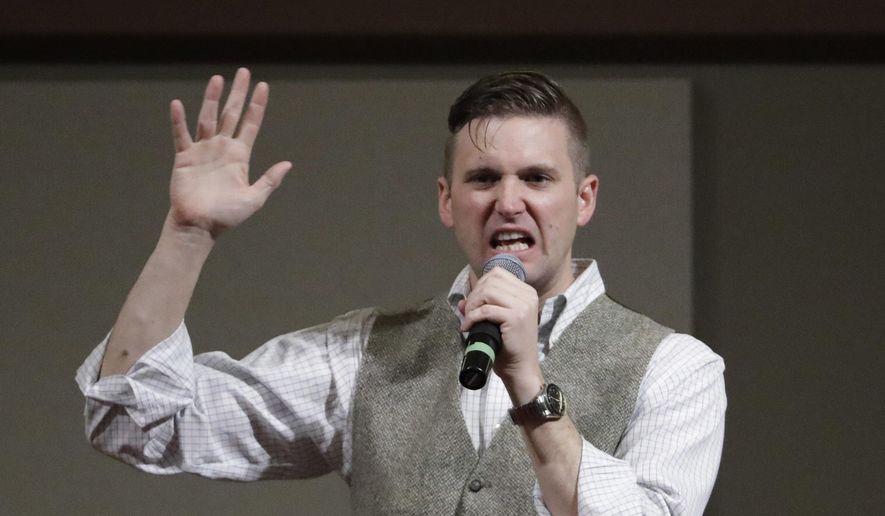The University of Florida will consider letting controversial white nationalist Richard Spencer speak on campus after all in spite of recently pulling the plug on his planned Sept. 12 appearance over his involvement in last month’s violent white supremacist rally in Charlottesville, Virginia.
The school’s interim general counsel responded to legal pressure Friday by saying the university’s decision to cancel Mr. Spencer’s previously scheduled speaking engagement wasn’t a blanket ban and that it would consider hosting him at a later date.
“It was never the intention of the University to permanently bar Mr. Spencer from speaking at an appropriate time and location at one of the University’s dedicated forums,” counsel Amy Hass wrote Friday to Mr. Spencer’s attorney, Gary Edinger.
Instead the university canceled the Sept. 12 event as “a direct response to the circumstances that developed during and after Mr. Spencer’s speaking engagement in Charlottesville, Virginia,” she wrote.
“The president gave the circumstances considerable deliberation and ultimately decided that the highly charged atmosphere following Charlottesville created a serious risk of violence and disruption if the speech took place on University grounds in early September,” the letter said.
“Any new request by Mr. Spencer will be treated in the ordinary course consistent with all other such requests,” Ms. Hass added, and in accordance with “generally applicable University policies, including important safety and security assessments.”
Mr. Spencer, the president of the National Police Institute white nationalist think-tank, was scheduled to headline the Aug. 12 “Unite the Right” rally in Charlottesville, but the event was canceled after attendees including white supremacists, neo-Nazis and Klansmen violently clashed with counterprotesters. A man identified as a “Unite the Right” attendee later drove an automobile into a crowd of counterprotesters, killing one woman and injuring 19 others.
Colleges including the the University of Florida, Michigan State University and Texas A&M subsequently blocked bids to book Mr. Spencer on campus over fears of repeating Charlottesville, and Mr. Spencer has responded by threatening litigation.
Mr. Edinger — a Florida attorney representing Mr. Spencer and the organizer of the Sept. 12 event — warned in a letter to the school earlier this week that he prepared to file a federal lawsuit against administrators within a matter of days unless they figured out a way to accommodate his clients, including potentially rescheduling the Sept. 12 event.
“We do not consider this exchange to be in the nature of a settlement negotiation,” Ms. Hass responded Friday. “The University believed at the time it decided to deny the request for the Sept. 12 speech that the decision was prudent and constitutional, and we continue to believe that it was.”
Mr. Spencer did not respond to a request seeking comment Friday. He previously sued Auburn University and won after the school tried prohibiting him from speaking on campus in April.
• Andrew Blake can be reached at ablake@washingtontimes.com.




Please read our comment policy before commenting.